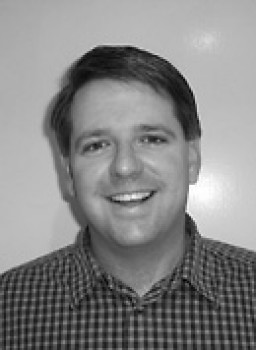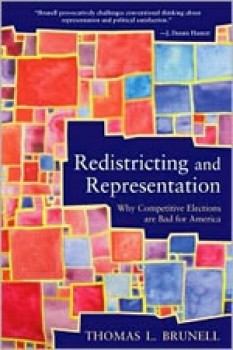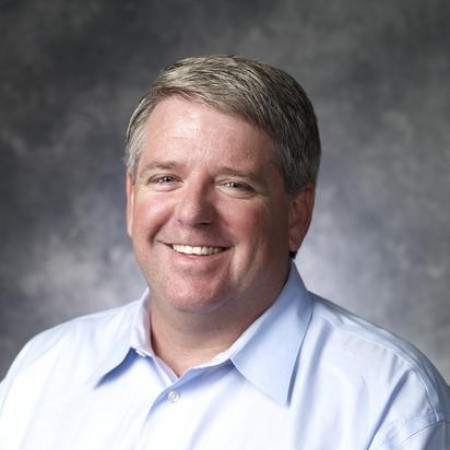Ph.D. - Political Science
University of California at Irvine - 1997
Professional Preparation
M.A. - Political Science
University of California at Irvine - 1993
University of California at Irvine - 1993
B.A. - Political Science
University of California at Irvine - 1991
University of California at Irvine - 1991
Research Areas
American politics, elections, redistricting, representation, US Congress, political partiesPublications
Merrill, Samuel III, Bernard Grofman, and Thomas L Brunell. 2023. How Polarization Begets Polarization: Ideological Extremism in the US Congress. Oxford: Oxford University Press. 2023 - Book
Brunell, Thomas, Robert Lowry, Banks Miller, and Thomas Gray. 2021. Introduction to American Government. Toronto: TopHat. 2021 - Book
Brunell, Thomas, Robert Lowry, Banks Miller, and Thomas Gray. 2021. Introduction to State and Local Government. Toronto: TopHat. 2021 - Book
Lublin, David, Lisa Handley, Thomas L. Brunell, and Bernard Grofman. 2020. “Minority Success in Non-Majority Minority Districts: Finding the ‘Sweet Spot’”. Journal of Race, Ethnicity, and Politics. 5: 275-298. 2020 - Journal Article
Brunell, Thomas L. 2020. “Congress,” In An Introduction to American Government, Toronto: TopHat. 2020 - Book Chapter
Brunell, Thomas L. 2020. “Elections,” In An Introduction to American Government, Toronto: TopHat. 2020 - Book Chapter
Brunell, Thomas L. 2020. “Legislatures,” In State and Local Government, Toronto: TopHat. 2020 - Book Chapter
Brunell, Thomas L. 2020. “Congressional Reapportionment”. In Voting and Political Representation in America, Mark P. Jones, Editor. Santa Barbara, CA: ABC-CLIO, pp 110-112. 2020 - Book Chapter
Appointments
Professor
The University of Texas at Dallas [2009–Present]
The University of Texas at Dallas [2009–Present]
Associate Professor
The University of Texas at Dallas [2005–2009]
The University of Texas at Dallas [2005–2009]
Assistant Professor of Political Science
Northern Arizona University [2003–2005]
Northern Arizona University [2003–2005]
Assistant Professor of Political Science
Binghamton University, SUNY [1999–2003]
Binghamton University, SUNY [1999–2003]
American Political Science Association Congressional Fellow
[1998–1999]
[1998–1999]
Visiting Assistant Professor
University of California, Irvine [1997–1998]
University of California, Irvine [1997–1998]
Projects
The Relationship Between Descriptive Representation of African Americans in Congress and Attitudes Toward Government
2004–2004 With Rachel Cremona and Chris Anderson, presented at The Annual Meeting of the Midwestern Political Science Association, Chicago, IL, April 14-17, 2004.The Relationship Between Parties and Interest Groups: Explaining Interest Group Donations
2002–2002 Presented at the Annual Meeting of the American Political Science Association, Boston, MA August 26-September 1, 2002.Do National Tides Affect Governors?: Midterm Loss in Gubernatorial Elections
2004–2004 With Robin Best, presented at The Annual Meeting of the Midwestern Political Science Association, Chicago, IL, April 14-17, 2004.The Entrance of Women into the U.S. Congress: The Widow Effect
2001–2001 with Lisa Solowiej. Presented at the Annual Meeting of the Southern Political Science Association. Atlanta, GA November 7-10, 2001.The Impact of Primary Type on Competitiveness of U.S. Congressional Primary Elections
2005–2005 Presented at the Annual Meeting of the American Political Science Association, Chicago, IL, September 1-5, 2004.Additional Information
Grants and Awards
- Intramural Grants Program, Northern Arizona University. $5,000 for a study on the impact of redistricting on House elections. Summer 2004.
- Deans Workshop Grant, "Methods and Politics," $3000, 2002-2003, with David Clark, David Rueda and Wendy Martinek.
- Deans Workshop Grant, "Democratic Institutions, Preference Aggregation and World Politics," $4000, 2001-2002, with David Clark and Patrick Regan.
- Dean's Research Semester Award. Binghamton University, 2001-2002.
- American Political Science Association Congressional Fellowship, 1998-99
- Order of Merit. Outstanding Graduate Scholarship. School of Social Sciences, University of California, Irvine, 1996-1997
- University of California Regents Dissertation Fellowship, Spring 1997.
- Scaife Foundation Fellowship to attend ICSPR summer statistical program, 1993.
Other Publications and Community Involvement
- Appeared on Think with Krys Boyd on KERA Channel 13 here in Dallas talking about my book.
- Quoted extensively in a Huffington Post story by Tom Edsall on political cycles. http://www.huffingtonpost.com/2008/06/24/obama-rides-the-wave_n_108848.html
- Appeared on local radio station (KRLD 1080 am) as a guest political commentator for a 3 hour election wrap up program for the Texas presidential primary election, March 4, 2008.
- Was one of four invited speakers, including one member of Congress, at North Central Texas College's 2nd Annual Conference on American Leadership, April 12, 2008, where I spoke about redistricting and representation.
- My research on cycles in American electoral politics was featured on Discovery's website http://dsc.discovery.com/news/2008/03/13/political-cycles.html
- Quoted in Pittsburgh Tribune Review on Thursday March 27 about jury deliberations. http://www.pittsburghlive.com/x/pittsburghtrib/news/cityregion/s_559258.html
- Quoted in Philadelphia Inquirer on Wednesday April 2 about jury deliberations. http://www.philly.com/philly/news/local/17215627.html
- My research with Patrick Brandt involving predicting the 2006 Congressional elections was quoted extensively in an article U.S. News and World Report.
- Wrote an op-ed for Newsday (New York) on the impact of timing of events for presidential elections. Published 1/4/04. This was reprinted in the Dodge City Daily
- Globe (Kansas) on 1/8/04 and in the Chattanooga Times Free Press (Tennessee) on 1/25/04.
- Spoke to Pi Sigma Alpha meeting on the Presidential Primary Process, February 2004.
- Delivered a speech to the League of Women Voters of Broome and Tioga Counties entitled "Redistricting after Census 2000: Playing Political Hardball." September 25, 2001
- Appeared as an hour long guest on NPR's "Talk of the Nation" to discuss the decennial census. March 7, 2001.
- Stone Sweet, Alec and Thomas L. Brunell. 2000. "The European Court, National Judges, and Legal Integration: A Researcher's Guide to the Data Set on Preliminary References in EC Law, 1958–98." Working paper. Robert Schuman Centre for Advanced Studies. European University Institute.
- Brunell, Thomas L. and Amihai Glazer. 1999. "Evidence for the Irrationality of Governmental Policy." Working paper, Center for the Study of Democracy, U.C. Irvine.
- Stone Sweet, Alec and Thomas L. Brunell. 1997. "The European Court and the National Courts: A Statistical Analysis of Preliminary References, 1961-95." Working paper 14/97, Jean Monnet Center, Harvard Law School.
- Appeared on News Channel 34 (ABC) on 11/12/00 discussing the process by which we amend the constitution.
- Appeared on Fox 40 on election night 11/7/00 as an analyst discussing the election.
- Appeared on WBNG TV (CBS) on 11/2/00 discussing voter fatigue.
- Appeared on News Channel 34 (ABC) on 11/2/00 discussing the Electoral College.
- Quoted in Press and Sun-Bulletin on 10/14/00 in an article about the 26th district Congressional election in New York.
- Appeared on WBNG TV (CBS) with students in my class discussing the second Clinton/Lazio debate, 10/8/00.
- Appeared on News Channel 34 (ABC) discussing Presidential debate, 10/4/00
- Appeared on News Channel 34 (ABC) discussing Presidential debate, 10/3/00
- Appeared on News Channel 34 (ABC) discussing the 2000 NY Senatorial primary, 9/12/00.
- Appeared on WBNG TV (CBS) News discussing the 2000 presidential primaries. March 7,2000.
- Appeared on WBNG TV (CBS) News discussing Census 2000 and its likely impact on New York. January 20, 2000.
- Appeared on WBNG TV (CBS) and News Channel 34 (FOX) talking about turnout in local elections. October 2, 1999.
- Brunell, Thomas L. "Accurate Census Count Vital for New York." The Press & Sun-Bulletin. July 25, 1999. Page 6E.
Teaching Experience
- Introduction to U.S. and Texas Government
- Political Parties and Interest Groups
- American Political Institutions
- Race and Redistricting
- Congress
- Campaigns and Elections
- Statistics
- Computer Based Research in Social Science
- Graduate seminar in American Politics
- Graduate seminar in Electoral Systems
- Graduate seminar in American Political Institutions
- Graduate seminar in Comparative Institutions
News Articles
EPPS Names New Associate, Assistant Deans
 UT Dallas’ School of Economic, Political and Policy Sciences (EPPS) has named a new associate dean for graduate programs and assistant dean for undergraduate studies. Dr. Tom Brunell, professor of political science, will oversee the graduate students, and Dr. Sarah Maxwell, clinical assistant professor in criminology and public policy, will work with students seeking bachelor’s degrees. Brunell succeeds Dr. Euel Elliott, professor of political science, who helped oversee a major expansion of the school during his 15 years in the position. Dr. Kruti Dholakia-Lehenbauer, clinical professor in public policy and political economy, formerly assisted the undergraduates.
UT Dallas’ School of Economic, Political and Policy Sciences (EPPS) has named a new associate dean for graduate programs and assistant dean for undergraduate studies. Dr. Tom Brunell, professor of political science, will oversee the graduate students, and Dr. Sarah Maxwell, clinical assistant professor in criminology and public policy, will work with students seeking bachelor’s degrees. Brunell succeeds Dr. Euel Elliott, professor of political science, who helped oversee a major expansion of the school during his 15 years in the position. Dr. Kruti Dholakia-Lehenbauer, clinical professor in public policy and political economy, formerly assisted the undergraduates.
Professor Questions Traditional Election Assumptions
 For the first time in decades, the nation is witnessing an intensively competitive race for the Democratic nomination for president.onventional wisdom holds that competitive elections are good for the electorate because they attract more people to the polls and keep elected officials honest by making them more closely follow the wishes of the electorate. But is competition always a good thing for voters? Given a choice, American voters would rather win than compete, according to Thomas Brunell, an associate professor in the School of Economic, Political and Policy Sciences at The University of Texas at Dallas, whose new book argues for less competition in general elections, not more. In his new book, Redistricting and Representation: Why Competitive Elections are Bad for America, (2008, Routledge), he says rather than draw districts 50-50, draw them so that they are overwhelmingly of one party or the other. Such a non-competitive system, would result in more competitive primary elections, better representation for all and less gerrymandering, the process in which the party in power draws district lines in order to dilute votes from the other party.
For the first time in decades, the nation is witnessing an intensively competitive race for the Democratic nomination for president.onventional wisdom holds that competitive elections are good for the electorate because they attract more people to the polls and keep elected officials honest by making them more closely follow the wishes of the electorate. But is competition always a good thing for voters? Given a choice, American voters would rather win than compete, according to Thomas Brunell, an associate professor in the School of Economic, Political and Policy Sciences at The University of Texas at Dallas, whose new book argues for less competition in general elections, not more. In his new book, Redistricting and Representation: Why Competitive Elections are Bad for America, (2008, Routledge), he says rather than draw districts 50-50, draw them so that they are overwhelmingly of one party or the other. Such a non-competitive system, would result in more competitive primary elections, better representation for all and less gerrymandering, the process in which the party in power draws district lines in order to dilute votes from the other party.
EPPS Professor Appointed to Census Committee
A political science professor at The University of Texas at Dallas recently was named to an advisory committee to the United States Census Bureau.Dr. Thomas Brunell, program head of political science, public policy and political economy in the School of Economic, Political and Policy Sciences, was appointed to the Census Scientific Advisory Committee in November.
The committee addresses emerging census challenges including adaptive design; cyber infrastructure; demographic, economic and statistical research; and technical and operational priorities. Members serve a three-year term.
